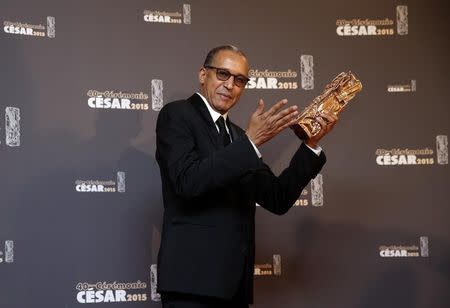'Timbuktu' director wants more cinema from West Africa
By David Lewis DAKAR (Reuters) - The Oscar nomination of "Timbuktu", a film about the occupation of the Malian desert town by al Qaeda-linked Islamists in 2012, should not mask the lack of established cinema from West Africa, its director said. Up for the Best Foreign Language Film at Sunday's ceremony, Abderrahmane Sissako's film has already won two awards at this year's Cannes Film Festival and seven at the Cesar Award's, France's equivalent of the Oscars. It tells how residents in the ancient town, which has a rich history as a seat of Islamic learning, resisted the harsh Islamic law imposed by militants, whose decrees ranged from bans on music and football to stoning those accused of adultery. Despite being home to FESPACO, a biennial film festival held in Burkina Faso, and Nollywood, Nigeria's cinema industry that churns out hundreds of films every years, Sissako called for West African leaders to do to more to promote regional film making "Being nominated is great for the continent and Mauritania ... (But) You cannot say that cinema is established because there is a festival," Sissako told Reuters, speaking from the United States. "When you have countries that produce one film a year or one film every three years, which is the reality of African nations, cinema is not well established," he said. Sissako was born in Mauritania but spent some of his school years in Mali. Based in France, much of his work focuses on Africa and issues from across the continent. "Timbuktu" was shot in the eastern deserts of Mauritania, near the border with Mali, where the Islamists were scattered in early 2013 by a French military intervention but there are still sporadic attacks as militants mount a resurgence. Sissako's crew received protection from Mauritania's security forces but he said that cinema, and culture in general, was still delegated to being a secondary issue for governments across in the region. "There is a lack of political vision in nearly all the countries," he said. "Wherever there is no culture it is not a good thing." His film highlights defiant individuals and the contradictions of the Islamists. An imam argues against the interpretation of Islam imposed by the mix of foreign and local gunmen. A woman fishseller refuses to wear gloves, as requested. Boys play a football match with an imaginary ball as the sport has been banned. Meanwhile, one Islamist secretly smokes a cigarette behind a sand dune while others debate the skills of top footballers. The resistance ordinary Malians show in the film highlights how, culturally, West African societies largely reject the form of Islam espoused by extremists. "We have to be clear - the salafists are a step backwards for society," Sissako said. "This is not something that we can resolve in two years. It is much more complex than that." "You should not minimise what NATO did in Libya. This was a major factor yet there has been a silence over this," he said, referring to the West's support for rebels who ousted the late leader Muammar Gaddafi. (Editing by William Hardy)

 Yahoo News
Yahoo News 

